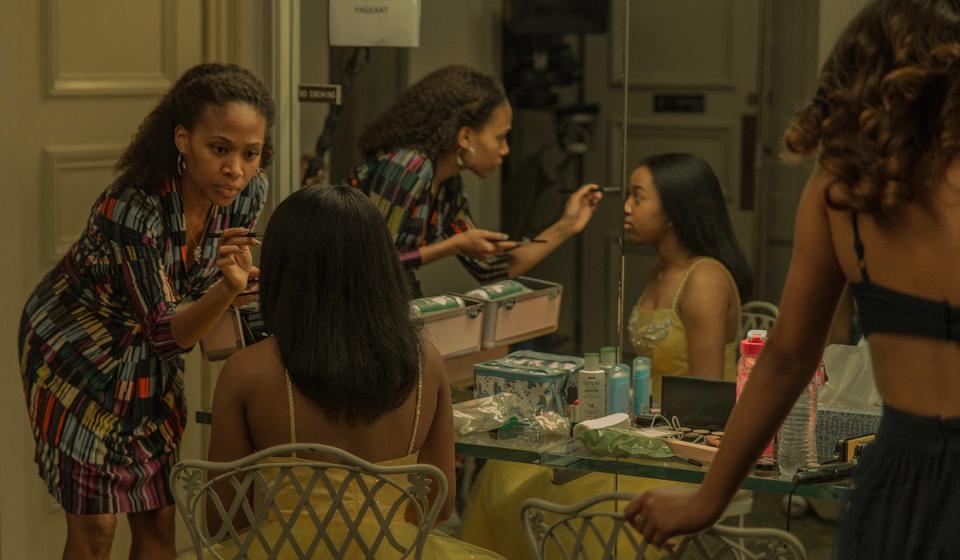Miss Juneteenth Is Your New Fave Pageant Movie, Mother-Daughter Drama, and Celebration of Black Women All in One
This year’s Austin Miss Juneteenth pageant winner, Kennede Wallace, waved at the crowd in triumph, draped in an ivory fur cape with sateen lining. It was a redemption for Wallace—she had twice competed in the event and lost the last two years. Her counterpart, Junior Miss Juneteenth Jazmine Hill-Pounders, competed on an antibullying platform and cinched the talent portion by playing saxophone.
In Tampa Bay, Miss Juneteenth Samantha Underwood accepted a tiara the size of a bishop’s hat, having sailed through categories like Artistic Expression, Presentation and Community Achievement, and Presence and Poise.
And San Antonio crowned not only Miss Juneteenth but also a Mr. Juneteenth, Jr. Miss Juneteenth, Little Miss Juneteenth, Mini Miss Juneteenth, four Princess Juneteenths, and one Duchess. They all graced the stage in an annual pageant that some Black communities put on to celebrate Juneteenth, sometimes with a sparkling top prize: a free ride to college.
“Ain’t no American dream for Black folks,” one character says in Miss Juneteenth, the stunning SXSW-award-winning debut of writer-director Channing Godfrey Peoples that's out now. But the pageant culture that is the focus of her movie gives Black girls a hint of the American dream—a shiny spectacle, prohibitively expensive to enter, and life-changing for just a few winners, the Miss Juneteenth pageant offers a patina of respectability at a high cost. It’s not exactly fair, and the characters in the movie would never expect anything to be.
Why should they? Juneteenth is a holiday that commemorates June 19, 1865, when enslaved African Americans in Texas learned that the Civil War was over and they were free—two and a half years after the Emancipation Proclamation had gone into effect. “It’s said there was celebration in the streets,” Godfrey Peoples tells Glamour. “But it was also said there was cautious celebration in the streets.”

Juneteenth represents freedom but also the quiet cruelty of freedom that is incomplete. After slavery was legally abolished, Southern states passed laws forcing many former enslaved people back into legal slavery, often by arresting them and then making them work for free throughout their sentences. Black Americans continued to be kept from freedom by Jim Crow laws, by segregation, and, today, by police brutality, voter suppression, the prison industrial complex, and other forms of discrimination. “Miss Juneteenth is a movie about dreams deferred,” says Godfrey Peoples. “We made a movie about a woman whose ancestors were enslaved. They found a way to get their freedom, but we’re still, as African Americans, finding a way to be free.”
Wait—is this too late in the article to say that Miss Juneteenth is funny? And charming? And that there is choreographed dancing, and that at one point I was biting multiple fingernails at once, waiting to see who would win the pageant? Miss Junteenth unflinchingly faces the heaviness of being a poor Black woman in the American South, but—and maybe I’m too used to the white-savior movies that make Blackness seem like a curse only white people can lift—it’s full of joy.
The movie follows Turquoise (Nicole Beharie of Little Fires Everywhere, perfect in every frame), a single mother who can’t climb out of her circumstances despite her two jobs, sharp mind, or even the Miss Juneteenth crown she won as a teenager and the full college scholarship that came with it. She’s not free, and she doesn’t believe she ever will be, but she dreams of getting her daughter there.
Literally trying to keep the lights on, Turquoise bets all her savings on her daughter—she pushes, prods, hair-straightens, and bedazzles the unwilling 14-year-old Kai into competing in the Miss Juneteenth pageant even though, as Kai points out, it “didn’t do nothing for you.”
Godfrey Peoples was never a pageant hopeful, but she grew up attending Miss Juneteenth every year. “I got to see African Americans going across the stage—they would literally glide,” she tells Glamour. “It was just completely affirming—their talented, intelligent, beautiful selves, with so much hope on their faces. For me, the question was always: What happened to those women?”
What happens to a woman who gets called “queen” without the resources of one? Turquoise picks up a second job putting makeup on corpses for open-casket funerals; she tries to reason with Kai’s father, who’s her on-again, off-again boyfriend; she begs, in desperation, the coldhearted owner of a dress shop (the only white character in the movie, refreshingly) for a break. It's never enough. But Kai (played by the buoyant, effortlessly talented newcomer, 18-year-old Alexis Chikaeze) turns out to be a phenomenal woman anyway. She’s a queen.
“What happens when good things come too late?” This question dogged Godfrey Peoples as she made Miss Juneteenth. “Thematically, we were always playing with this idea of slaves finding their freedom late, and the women who are those slaves’ ancestors.”
In the end, Miss Juneteenth is coming out at a time that feels both strange and right—Godfrey Peoples made it with her husband over the course of nearly seven years. In the middle of making the movie, she became a mother herself for the first time. Now her film will be released during a pandemic and a historic antiracist uprising, on what may be the most widely celebrated Juneteenth in America in the last 100 years.
It’s not exactly the American dream, but it’s something much more real.
Miss Juneteenth is available on demand and on digital on June 19, through all major providers.
Jenny Singer is a staff writer for Glamour. You can follow her on Twitter.
Originally Appeared on Glamour
